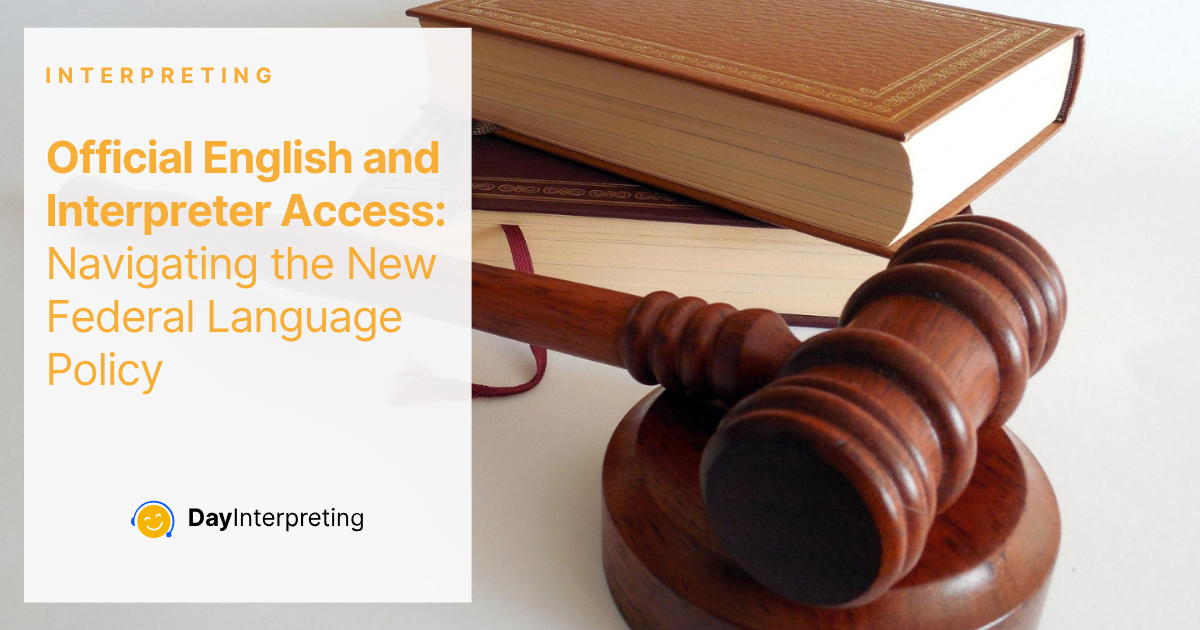On March 1, 2025, President Trump signed Executive Order 14224, declaring English the official language of the United States, a significant first in the country’s history. But what does the new Federal Language Policy really mean?
The order rescinds Executive Order 13166 (issued by President Clinton), which had guided federal language assistance for people with limited English proficiency (LEP) since 2000.
In July, the Department of Justice released implementation guidance directing federal agencies to minimize non‑English services, reallocate resources toward English-language instruction, and phase out “non-essential multilingual offerings”. The IRS is reportedly considering eliminating translations for over 100 forms and discontinuing free interpretation services, moves critics warn may lead to increased reporting errors and reduced participation from immigrant communities.
Which Legal Mandates Still Apply Under the New Federal Language Policy
Critically, this executive order does not repeal existing federal laws that require language services. Title VI of the Civil Rights Act and Section 1557 of the Affordable Care Act still obligate organizations receiving federal funds to provide meaningful access to LEP individuals.
Federal agencies may now determine when to continue non-English services, making the future of interpreting access uneven and agency-specific.
Why Interpreters Should Care About the New Federal Language Policy
This policy shift raises urgent concerns about equitable access and the future of language services:
- Reduced contracts and funding for interpreting services may force hospitals, courts, and agencies to rely on ad hoc or unqualified interpreters, raising risks of misinterpretation, legal liability, and medical error.
- Federal agencies now have discretion, leading to service gaps. CAPAC members have demanded clarification on how agencies will uphold obligations to LEP communities amid changing policy priorities.
- Interpreter demand may shift regionally, favoring agencies or states that maintain robust language access programs, while others cut back.
What Interpreting and Language Service Providers Can Do
1. Advocate and Educate
Educate clients, health systems, and government agencies on the legal requirement to comply with Title VI and Section 1557, regardless of the executive order.
Advocacy and coalition-building with civil rights groups remain vital. Continue pressing agencies for transparency and compliance, even as guidance evolves.
2. Monitor Policy Implementation
Track agency language service audits and phase-out plans. The DOJ has mandated that agencies prepare language access plans within 180 days, outlining when and how non-English services may continue.
Providers can submit public comments or legal input during that review window.
3. Diversify Service Offerings
With federal contracts potentially shrinking, interpreters and language providers should expand capabilities into:
- Healthcare providers under private funding or state mandates
- Local and state government services, some of which are introducing new legislation to expand LEP protections
- Community-based nonprofit organizations and workplaces serving immigrant and language-minority communities
4. Emphasize Quality and Certification
As agencies potentially shift to untrained or volunteer interpreters to cut costs, certified, high-quality interpreting becomes a key differentiator.
Providers can focus on:
- Certified medical and legal interpreting
- Specialized dialect expertise and cultural competency
- Trauma-informed interpreter training
5. Promote Hybrid and On-Demand Models
Flexible models, remote interpreting, on-demand video relay, and decentralized scheduling—offer scalable service options for agencies racing to maintain access within tighter budgets.
Looking Ahead: What July 2025 Signals
- Legal obligations remain: the executive order does not override Congress-passed statutes. Agencies must still comply unless laws are repealed or limited by Congress.
- Implementation is discretionary, not prohibitive. Non-English services may continue, but only when agency leadership deems them mission-critical.
- Interpretation demand may fragment: some agencies will cut back, others may resist. Interpreting professionals should expect variations across sectors and geography.
Final Word: Interpreters at the Language Access Frontier
As of July 2025, interpreters and language service providers face a turbulent policy landscape. Executive mandates have shifted priorities, but statutory protections still stand. That makes interpreter advocacy, visibility, and flexibility more important than ever.
Interpreters don’t just fill gaps; they fortify democracy by ensuring language does not become a barrier to civic participation, healthcare, justice, or services. In this moment of policy change, interpreters can reaffirm their role as guardians of access, and champions for every community’s right to understand and be understood.





0 Comments